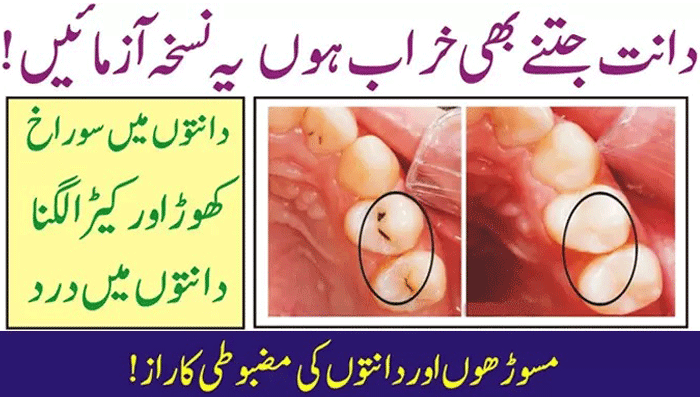
Maintaining good oral health is essential for a radiant smile and overall well-being. Among the common oral issues that many people face, cavities and tooth decay stand out as significant concerns. In this article, we’ll talk about cavities and cover what causes them, signs you might have one, ways to treat them, and easy things you can do at home to keep your teeth healthy and shiny.
What Causes Cavities: Cavities, or dental caries, happen when the outer layer of your teeth (tooth enamel) slowly wears away due to various factors working together. The primary culprit is plaque, a sticky film of bacteria that forms on teeth. When we consume sugary or starchy foods, the bacteria in plaque produce acids that attack the tooth enamel, leading to decay over time.
Get Rid of Dental Caries with Home Remedies

It’s important to note that they may not always be immediately apparent. Early on, you might not experience any discomfort, making regular dental check-ups crucial for early detection.



Signs and Symptoms
As cavities progress, certain symptoms become more noticeable. Sensitivity to hot or cold foods, spontaneous toothaches, and visible holes or pits in the teeth are common indicators. If you notice these signs, it’s time to schedule a visit to your dentist for a thorough examination.
Now, let’s explore the available treatment options for cavities.
Seeking Professional Treatment
Once a cavity is identified, your dentist may recommend various treatments based on the severity of the decay. For minor cavities, dental fillings are a common solution. This involves removing the decayed portion of the tooth and filling the space with materials like amalgam or composite resin.
In cases where the decay is more extensive, a dental crown may be necessary to restore the tooth’s structure. For severe cavities that reach the tooth’s pulp, a root canal procedure may be recommended to remove the infected pulp and save the tooth.
How to Prevent Cavities?
Preventing cavities is undoubtedly the best approach. Regular brushing with fluoride toothpaste, flossing, and limiting sugary or acidic food intake can go a long way in maintaining oral health. Additionally, professional dental cleanings every six months help remove plaque and tartar buildup that regular brushing might miss.
Home Remedies for Cavities
1. Oil Pulling:
What is it? Oil pulling is an old method where you swish coconut or sesame oil around in your mouth for 15-20 minutes.
How does it help? This helps by reducing the number of germs and sticky stuff (plaque) in your mouth.
Why is it good? Less germs and plaque mean healthier teeth.
2. Saltwater Rinse:
What is it? This is when you rinse your mouth with warm water mixed with a little bit of salt.
How does it help? It helps to make pain and swelling from cavities feel better.
Why is it good? The saltwater rinse can soothe your mouth and make it more comfortable.
3. Green Tea:
What is it? Green tea is a type of tea that is good for you.
How does it help? It has things called antioxidants that stop bacteria from growing in your mouth.
Why is it good? Drinking green tea often can keep your mouth healthy by stopping bad bacteria.
4. Xylitol Gum:
What is it? This is a gum that doesn’t have sugar, and it has something called xylitol in it.
How does it help? Chewing this gum makes your mouth make more spit, which helps to clean your teeth.
Why is it good? More spit is like a natural cleaner for your mouth, and it stops your teeth from getting damaged.
5. Calcium and Vitamin D:
What is it? Calcium and vitamin D are things that are good for your teeth.
How does it help? They make your teeth strong and healthy.
Why is it good? Eating foods like milk, leafy greens, and fatty fish that have these things keeps your teeth in great shape.
FAQs about Cavities:
Q: Can cavities cause problems with the brain?
A: While cavities themselves don’t directly cause problems with the brain, untreated cavities and gum disease can lead to infections that, in rare cases, may spread to other parts of the body, including the brain. Maintaining good oral health is crucial to prevent such complications.
Q: Are there any signs of cavities that go beyond toothaches and sensitivity?
A: Yes, in advanced stages, cavities can manifest as bad breath that doesn’t improve with oral hygiene, a foul taste in the mouth, or pain when biting down. If you experience these signs, it’s important to consult your dentist for a thorough examination.
Q: Can oil pulling completely replace traditional oral hygiene practices like brushing and flossing?
A: No, oil pulling should not replace regular brushing and flossing. While it may help reduce harmful bacteria in the mouth, it’s not a substitute for the mechanical removal of plaque through brushing and flossing. Incorporating it as a supplementary practice may contribute to overall oral health.
Q: Is it true that xylitol gum can prevent cavities?
A: Chewing xylitol gum can help stimulate saliva production, which has a natural cleaning effect on teeth. However, it’s essential to use it as part of a comprehensive oral care routine that includes regular brushing, flossing, and professional dental cleanings for optimal cavity prevention.
Q: How do calcium and vitamin D contribute to oral health?
A: Calcium and vitamin D are essential for maintaining strong teeth and bones. They promote remineralization, which is the process of restoring minerals to tooth enamel that may have been lost due to acidic erosion. Including foods rich in calcium and vitamin D in your diet can contribute to overall dental health.
In Conclusion, Cavities are a common dental woe, but armed with knowledge and a proactive approach, you can keep them at bay. Regular dental check-ups, a diligent oral hygiene routine, and incorporating natural remedies into your daily life contribute to a healthy and happy smile. Remember, prevention is the key to maintaining optimal oral health, so make those routine dental appointments and embrace a lifestyle that promotes the well-being of your teeth. Your smile will thank you in the long run!






